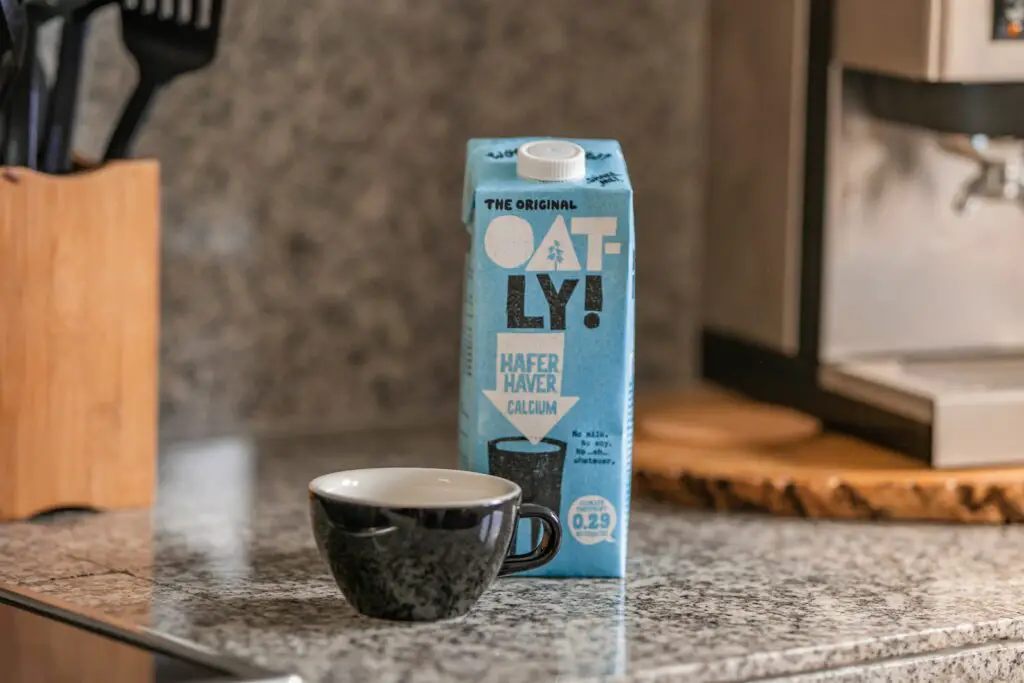Oat milk has become an increasingly popular alternative to dairy milk in recent years, with Oatly being one of the leading brands in the market.
As more people turn to plant-based milk alternatives for environmental and health reasons, the question of properly disposing of these products’ packaging becomes more important.
In particular, many consumers are curious whether Oatly cartons can be recycled.
In this article, we will explore the topic of recycling Oatly cartons and provide information on how to dispose of them properly.
So Can You Recycle Oatly Cartons?
Yes, oat milk containers, including Oatly cartons, are typically recyclable.
However, the specific recycling guidelines for these containers can vary depending on your location and the recycling program in your area.
Most Oatly cartons are made from paper, plastic, and aluminum.
These materials can be recycled but may need to be separated before recycling.
Sometimes, the plastic or aluminum layers in the carton may need to be removed before the remaining paper layers can be recycled.
To ensure that your Oatly cartons are properly recycled, it’s important to check with your local recycling program or waste management company for specific guidelines.
They can provide information on the materials they accept for recycling and any requirements for preparing your recycling for collection.
Oatly cartons are typically made from paper, plastic, and aluminum.
These materials are all recyclable but may need to be separated before recycling.
Sometimes, the plastic or aluminum layers in the carton may need to be removed before the remaining paper layers can be recycled.
What are oatly milk cartons?
Oatly milk cartons are the packaging used for Oatly brand oat milk products.
Oatly is a Swedish brand of plant-based milk made from oats, which has gained popularity in recent years as a dairy milk alternative.
Oatly milk cartons are made from a combination of paperboard, plastic, and aluminum and are designed to be lightweight, durable, and easy to transport.
The cartons are typically available in various sizes, including small single-serving sizes and larger family-sized options.
They are widely distributed in grocery stores and other retailers around the world.
Can you reuse oatly milk cartons?
Oatly milk cartons are designed to be single-use, disposable containers.
While it is technically possible to reuse them, it is not recommended for several reasons.
First, the cartons are not designed for reuse and may need to be held up well after washing.
Second, reusing cartons can pose a health risk as they may not be properly cleaned and sanitized, potentially leading to the growth of harmful bacteria.
Finally, reusing cartons goes against the principles of reduce, reuse, and recycle, prioritizing reducing waste and minimizing the use of disposable products.
It is generally better to recycle oatly milk cartons after use or find alternative containers designed for reuse, such as glass jars or stainless steel bottles.
How can we reduce milk carton waste?
Reducing milk carton waste can be done in several ways.
Here are some ideas:
Switch to a reusable alternative: Consider buying milk in glass bottles or investing in a durable, reusable container for your milk.
This can significantly reduce the amount of waste generated from single-use cartons.
Buy in bulk: Buy milk in larger containers instead of individual servings.
Opt for refillable cartons: Some stores offer refillable milk cartons that can be returned for cleaning and refilling.
Check with your local stores to see if this is an option.
Look for recyclable cartons: Check the packaging for recycling symbols and information on properly disposing of the carton.
Use cartons for other purposes: If you use milk cartons, consider repurposing them for other uses, such as seed starters, planters, or bird feeders.
By taking these steps, we can reduce the amount of milk carton waste generated and move towards a more sustainable future.
Are milk cartons plastic or cardboard?
Milk cartons can be made of different materials, but they typically consist of a combination of paperboard, plastic, and sometimes even aluminum.
The main body of the carton is usually made of paperboard, a type of cardboard.
However, to keep the milk fresh and prevent leaks, the carton is coated with a thin layer of plastic inside.
Some cartons may also have a plastic cap or a plastic pour spout.
So, while milk cartons contain cardboard, they are not entirely made of cardboard and contain plastic components.
Milk cartons have evolved, and different types may have different compositions.
For example, some milk cartons may have additional layers of plastic or aluminum to protect against air and light, which can help keep the milk fresh for longer.
Because of the combination of materials used in milk cartons, they can be challenging to recycle.
The paperboard portion of the carton can usually be recycled, but the plastic and aluminum layers must be separated and processed separately.
Some recycling facilities have the technology to do this, while others do not, which means that not all recycling programs accept milk cartons.
Are oatly milk cartons better than plastic?
Yes, Oatly milk cartons are generally better than plastic as they are made primarily of renewable materials such as paperboard and plant-based plastic coatings.
In contrast, plastic milk containers are made entirely of non-renewable petroleum-based plastic.
Oatly milk cartons are also lightweight, which reduces transportation emissions and the amount of material required to produce them.
Additionally, the plant-based coatings used in Oatly cartons are designed to break down more easily in recycling facilities than traditional plastic coatings.
Overall, choosing products in packaging that can be recycled or made from renewable materials can help reduce waste and environmental impact.
Reference
FAQs | Oatly US. (n.d.). FAQs | Oatly US. https://www.oatly.com/en-us/random-answers
(2020, September 27). Environmental Footprint of Milk Containers – San Jose Recycles. Environmental Footprint of Milk Containers – San Jose Recycles. https://sanjoserecycles.org/environmental-footprint-of-milk-containers/
Can You Recycle Tetra Pak? (2023, March 1). Kempii. https://www.kempii.co.uk/blogs/zero-in-on-waste/can-you-recycle-tetra-pak
(2023, February 22). Eco-Tips: How To Recycle Milk Cartons for The Environment. ecomaniac.org. https://ecomaniac.org/how-to-recycle-milk-cartons/







